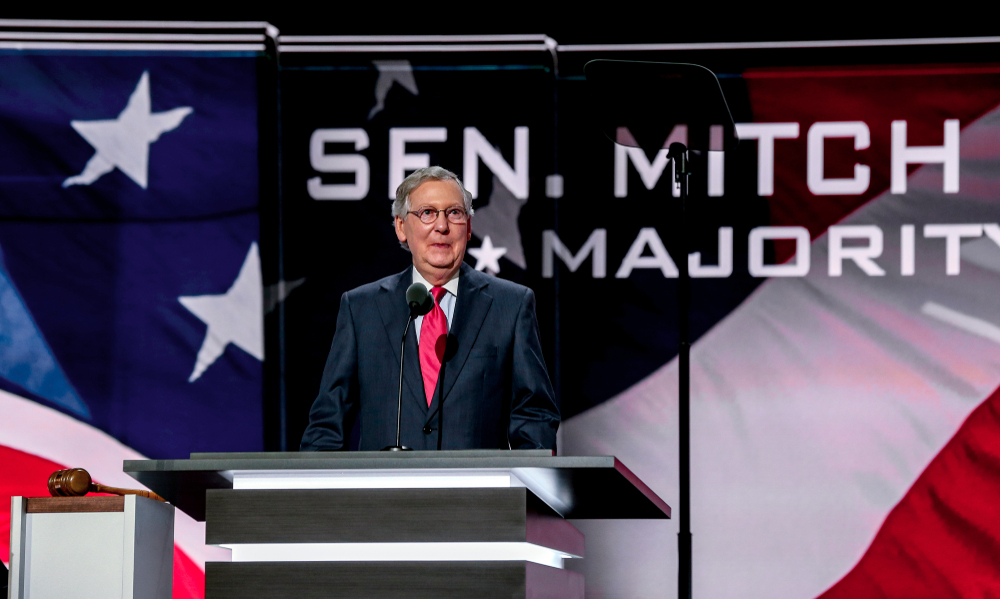The Fight To Fill All Judicial Vacancies Must Anticipate And Preempt Obstruction

Sen. Mitch McConnell. Caption: Shutterstock/Mark Reinstein

The Biden administration has made incredible progress in seeing its highly qualified and refreshingly diverse judicial nominees confirmed by the Senate — 105 to date. Even so, there are challenges ahead. Nearly 120 federal court vacancies remain unfilled, including 62 without nominees. Worse, 63% of those vacancies are in states with two Republican senators who have made clear their goal of blocking President Biden’s nominees from reaching the bench. Why allow their obstruction to slow crucial progress or compromise the quality of the nominees?
Make no mistake, Senate Republicans are employing the same delay tactics they used under President Obama to block nominees and leave vacancies open for a future Republican administration like President Trump’s. Behind the disguise of benign Senate formalities, these tactics are part of an effort to stack our courts with extremist judges who all but guarantee the most conservative-leaning rulings.
Out of the 323 circuit and district court judges appointed by President Obama, only 20 were confirmed during his final two years in office when Republicans controlled the Senate. As a result, President Trump entered office with a dizzying 106 judicial vacancies to fill. The well-known cherry on top of this pie was President Trump’s appointment of Justice Neil Gorsuch to the United States Supreme Court. This was only possible because Sen. Mitch McConnell stalled President Obama’s nomination of Merrick Garland to the Supreme Court for eight months to save it for what he hoped would be a new Republican president — a successful gamble made possible by unfettered obstruction.
Bad-Faith Consultation
It can be hard to identify, but this administration and the country cannot afford to leave anything to chance. Bad-faith consultation with the Biden administration is a key tool of obstruction for Republican senators. Federal judges are appointed by the president with the advice and consent of the Senate. Formally, this is done through the confirmation process, but this constitutional requirement also created an expectation over time that home-state senators and the president consult about potential nominees prior to nomination. That seems simple enough, but what happens when home-state senators refuse (or delay) cooperation or insist upon nominees with unacceptably conservative records?
Currently, Texas has the second most judicial vacancies without nominees after Florida, including a circuit court seat that has been open since last summer due to bad-faith consultation. Texas Sen. Cornyn recently criticized the Biden administration for not filling vacancies in Texas and claimed the Biden administration isn’t considering his and Sen. Ted Cruz’s suggested nominees. However, last year he was quoted in an article discussing his plans to block nominees he deems “too liberal,” admitting bad-faith consultation on his part —or a lack of consultation altogether. As a result, there are no pending nominees for Texas vacancies.
The Blue Slip
The blue slip is another opportunity for actors who have traditionally acted in bad faith to do more of the same. It is an informal policy — a courtesy — that is ripe for misuse. Essentially, the blue slip creates a political veto that allows home-state senators to signal their approval or disapproval of a nominee. By not returning a blue slip or taking extensive time to come to a decision, Republican senators can block district court nominees nominated in their state from advancing.
The blue slip can easily be ended. In 2017, Chairman Grassley discarded the practice of blue slips for circuit court nominations to allow more of President Trump’s radical nominees to advance out of the Senate Judiciary Committee. At the time, Sen. Mitch McConnell said that a blue slip should be viewed “as simply [a] notification of how you’re going to vote, not as an opportunity to blackball” a nominee. Following this example, Chairman Durbin could end the practice today for district court nominees, clearing the way for well-qualified and fair-minded nominees that obstructionist conservatives have arbitrarily blocked. He’d have support from some Senate Democrats on the committee, such as Sen. Blumenthal who recently stated, “I have no love or allegiance to blue slips… I think they are an artifact of Senate tradition which should go if they’re used as an obstacle to block qualified nominees.”
Quorum Antics
More drastic tactics remain on the table, such as weaponizing the quorum. Senate rules require a quorum of the committee — nine members, including two members of the minority — to be present to vote a nominee out of committee. So, if no minority members show up, business cannot be conducted.
It’s a drastic option that was most recently used by protesting Democrats when the Republican then-majority forced a committee vote on Justice Amy Coney Barrett six weeks before the 2020 election. This was quite the hypocritical turnaround from four years earlier, when they claimed Garland could not be confirmed because it was an election year. In response, the Republican majority changed the quorum rules to still pass Justice Barrett to the floor — again demonstrating a refusal to play by the same rules they now hide behind.
Obstruction’s Impact on Justice
We must be very clear-headed about the aim of these delays: to keep nearly 120 vacancies open. Unfortunately, the minority is creating two systems of justice with this scheme. Jurisdictions with full benches see justice delivered in a timely manner, while those seeking justice in circuits and districts with empty seats face an ever-growing backlog of cases. Worse, in states like Texas, conservatives can bring lawsuits in courts knowing exactly which Trump-appointed conservative extremist they’ll be assigned as a judge, guaranteeing the political outcome they seek.
Americans deserve fully-staffed courts and we cannot allow any form of obstruction to block qualified candidates from a seat on the federal bench. A true commitment to justice requires a new approach and bold action — naming and restricting these obstruction tactics.
Mari Nemec is a Dorot Fellow at Alliance for Justice.